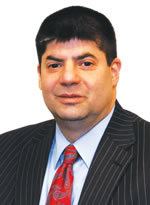Allegro
The Right to Form a Union
The labor board makes an important decision about the rights of musicians who work for a theatre. Local 802 members take note!
Volume 116, No. 3March, 2016

Harvey Mars, Esq.
Harvey Mars is counsel to Local 802. Legal questions from members are welcome. E-mail them to hsmlaborlaw@harveymarssattorney.com. Harvey Mars’s previous articles in this series are archived at www.harveymarsattorney.com. (Click on “Publications & Articles” from the top menu.) Nothing here or in previous articles should be construed as formal legal advice given in the context of an attorney-client relationship.
It is quite unusual for a union organizing campaign to target a theater owner. The reason is obvious. Usually, it’s the producer – not the theatre owner – who’s in charge of hiring musicians. Unless there is a core group of musicians employed by the theater itself, the effort is not even legally possible. The National Labor Relations Act says that some amount of regular employment is required in order to proceed with a union representation election. The labor board has established several guidelines to determine if a cohesive unit exists.
But in some cases, a theatre is, in fact, actually the employer of musicians. For example, the Paper Mill Playhouse in Millburn, New Jersey has a collective bargaining agreement with AFM Local 16-248. That agreement contains a primary hiring list of musicians who have first call rights to perform for all productions.

Musicians at the Wang Theatre in Boston won the right to a union election. Photo: Tim Pierce via Wikimedia Commons
All of this is relevant to the case I’d like to discuss in this article. It concerns the Wang Theater (managed by the Citi Performing Arts Center), a 3,600-seat venue in the heart of Boston. AFM Local 9-535 (Boston) is attempting to win union recognition for all musicians employed by the theatre. So far, the musicians are winning. Region 1 of the NLRB has just ordered the venue to allow musicians to vote on union representation. Not surprisingly, the Wang Theatre challenged the decision.
This case presents some interesting issues that are relevant to Local 802’s organizing campaigns. I devote this article to reviewing these issues.
Lawyers for the Wang Theatre asserted that there was no appropriate bargaining unit because the theater is not the sole employer of musicians who perform there. They argued that each show is mounted by a separate producer who has ultimate control over key working conditions and elements.
NLRB Region 1 did not agree. First and foremost, the Wang Theater and Local 9-535 had a prior bargaining relationship that had lapsed in 2007. Factually, little had changed since 2007 with respect to the theater’s control and authority over musicians’ terms and conditions of employment.
Furthermore, the Wang Theatre could not prove that producers actually had control over the musicians’ terms and conditions of employment. Ultimately, even if such proof had been presented, it would simply have supported a joint employer relationship rather than the existence of an improper bargaining unit. (I wrote about joint employership in my November column here.) A well-known example of joint employership is in Local 802’s agreement with the Broadway League, the organization that represents both theatre owners and theatre producers.
Next, the theater contended that the labor board must adopt a formula for voter eligibility that would have disqualified most of the musicians who had previously worked at the theater. According to the NLRB’s traditional eligibility standard, in order for an employee to be eligible to vote in a union representation election and thus be included in the recognized bargaining unit, the employee must have worked an average of four or more hours a week during the last quarter prior to the election. This, of course is a standard that few musicians who had worked at the theater would have satisfied due to the infrequency of employment for theatrical productions. (Of the 21 productions performed at the Wang in 2014, only two used live musicians.) That would have seemed to be a fatal blow to musicians. However, the NLRB has adopted special voter eligibility rules that take into account irregular employment patterns evident within the entertainment industry. These rules are codified in a decision rendered by the NLRB in The Juilliard School, 208 NLRB 153 (1974), which has been followed in many similar situations. The Juilliard decision only requires that musicians work on two productions for a total of five days over one year, or at least 15 days in two years. This standard, ultimately adopted by Region 1 for this election, ensured the greatest density of bargaining unit membership. Given the nature of theatrical employment, the Juilliard standard “permits optimum employee enfranchisement and free choice, without enfranchising individuals with no real continuing interest in the terms and conditions of employment offered by the employer.” Trump Taj Mahal Casino, 306 NLRB 294, 296 (1992).
As a result of Region 1’s decision, the musicians of the Wang Theatre may now have the opportunity to form a union and negotiate a fair contract. A mail ballot vote was scheduled to be conducted on Feb. 29. Thus, by the time this article is published, I hope a certification order has been issued by Region 1 requiring the theater to recognize and negotiate with Local 9-535 as the exclusive bargaining representative of the musicians it employs. We wish the musicians Godspeed in this endeavor.
